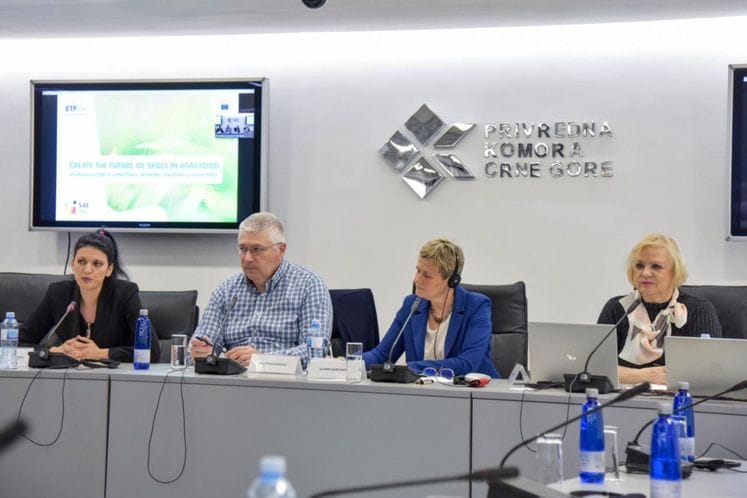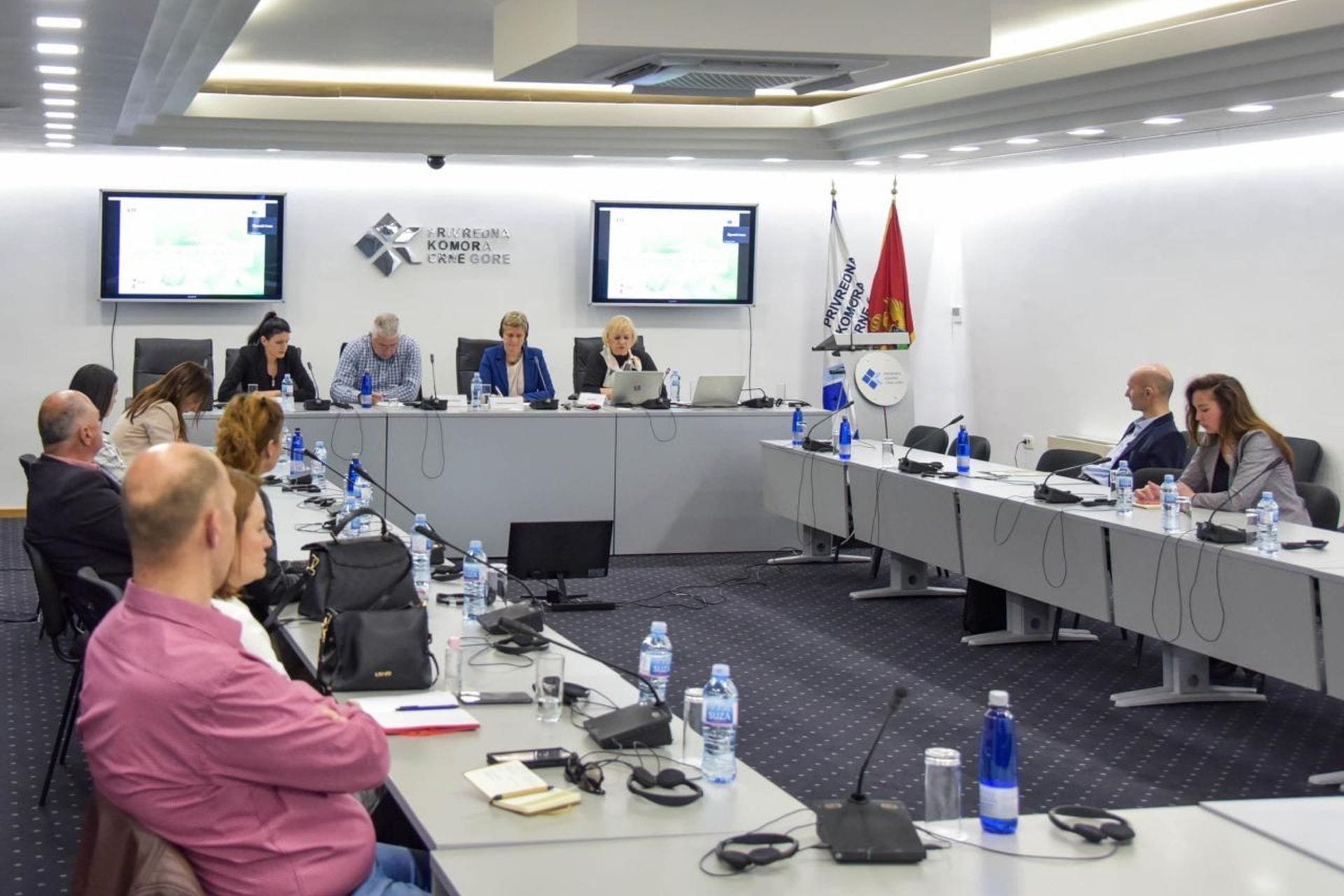- Government of Montenegro
Ministry of Economic Development Skills improvement in agri-food sector
Skills improvement in agri-food sector

“Skilling up the Western Balkans agri-food sector: greening, digitalising” was in the focus of the event organized by the Chamber of Commerce of Montenegro on April 12, in cooperation with the Ministry of Economic Development and supported by the European Training Foundation (ETF).
The event was focused on the activities aiming at providing tailored support in linking the vocational education and training of SMEs in the field of innovation and skills development targeting increase of productivity and quality of work in the agri-food sector.

Mrs. Lidija Rmuš, Secretary of the Board of Association of Agriculture and Food Industry of the Chamber of Commerce, moderated the event. She emphasized the importance of agriculture, one of the strategic branches of development of Montenegro and pointed out that the pandemic and the crisis caused by the war in Ukraine would significantly affect the business of companies in this area. In order to mitigate the impact of the aforementioned, it is important that producers, through European projects, receive appropriate assistance in identifying different ways to address common challenges in the agri-food industry.
“It is very important that the goal of this project is to help connecting small and medium enterprises, business associations and industrial clusters from the Western Balkans with partners in the European Union on building skills for digital and sustainable transition in the agri-food industry”, Rmus said.
Mr. Milutin Djuranovic, President of the Board of the Association of Agriculture and Food Industry, believes that increasing food production and creating better conditions for doing so, in order to ensure a more secure supply, is an imperative and should be the main goal of the future Strategy for Agricultural Development.
“The key role in this process should be played by the state, which should provide significantly higher allocations for the development of agriculture and food production than before. Various instruments of tax policy (such as reduction of VAT on food, introduction of zero tax rate in crisis situations for necessary inputs in production etc.), establishment of a special guarantee fund for crediting food production, etc. in order to create an environment for increasing domestic production” Djuranovic said.
He added that one of the goals of the future strategic approach should be the need to renovate villages and improve living conditions in rural areas with an emphasis on strengthening the rural tourism, and providing special benefits for innovation in the agri-food sector in line with green economy goals. He also emphasized the necessity of adopting the Law on Agricultural Land in order to contribute to the development of agriculture.
Mrs. Marijeta Barjaktarović Lanzardi, Acting Director General for Digital Economy and Technological Development in the Ministry of Economic Development and National S3 Coordinator, reminded that Montenegro adopted the Smart Specialization Strategy (S3) in 2019 and that "Sustainable Agriculture and Food Value Chain" was identified as one of the priority areas. For the implementation of the S3 strategy, communication and networking between the public administration, economic sector, in this case farmers, the scientific research community and the civil sector is of the great importance.
“The goal is to achieve continuity in the implementation of the strategy through the establishment of an efficient implementation and programming framework for S3, which we successfully finalized at the end of the last year. We are working on the networking of the S3 programmes, while the long-term ambition is to create a model of the integrated budgeting for smart specialization” - said Barjaktarović Lanzardi. She confirmed that strengthening skills in the agri-food industry was recognized as a common priority for all countries in the region, along with ICT. “I invite companies from this sector to establish cooperation with colleagues from the EU so that in one of the next phases, with the help of the S3 team, good S3 projects can be generated.”
Mrs Ulrike Damyanovic, Senior Human Capital Development Expert - Focal point for South Eastern Europe and Turkey - Country Liaison for Montenegro, European Training Foundation (ETF), presented the scope of work of her institution foundation and the current call for up skilling of the Western Balkans agri-food sector. "Create the future of skills in the agri-food industry: working alone is something, working together is everything," is the title of the call for proposals. The call is intended for micro, small and medium enterprises, business associations and clusters in the Western Balkans that invest in improving the skills of employees in the agri-food sector in order to connect them with credible partners from the European Union of a similar profile. The ultimate goal is to support skills building for digital and sustainable transition in the agri-food sector.
“This European Training Foundation initiative is especially focused on skills for smart specialization in the agricultural industry, as a priority sector in the Western Balkans” - Damyanovic said.
She pointed out that agriculture in Montenegro represents an exceptional potential, but people with the skills and capacities are needed to implement a smart specialization strategy, but also all other strategies relevant to future development. She pointed out that skills should be developed continuously, but also that one needs to be prepared to adapt to the conditions of the current situation, in order to adequately respond to unforeseen crises. She especially emphasized the importance of synergistic action of all economic branches, especially agriculture with tourism and energy.
Damyanovic said that peer learning is extremely important in the agricultural sector, as it allows joint thinking, and work on understanding future skills acquisition needs and identifying different ways to address common challenges in the industry.
According to her, it is necessary to analyze the technologies and tools for future skills development and trends, and understand how they affect the delivery of education and training in the field of agri-food.
“Networking and support for the implementation of smart specialization will facilitate the overcoming of barriers that small and medium enterprises have, and skills development in the agri-food industry will be a key ingredient for inclusive economic growth” - concluded Damyanović.
